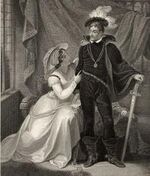Henry 'Hotspur' Percy, a well-known and successful English soldier, had helped overthrow King Richard II (who later died in 1400) in support of Henry of Lancaster. As a result, Henry of Lancaster became King Henry IV. When Hotspur became discontented with the Lancasters, Hotspur decided to rebel against the king. The POD, Instead of being killed, Hotspur's forces were able to hold on long enough for Hotspur's father (the Earl of Northumberland) to arrive with his forces. When the Earl arrives, the Battle of Shrewsbury ends with the death of Henry, Prince of Wales. The result creates more tension for the throne of England, pushing back the start of the War of the Roses from 1455 to 1431.
1403—1405: Rebellion[]
After the Battle, Hotspur gained considerably support, especially among the Yorkist forces. He turned his attention to King Henry IV. A battle north of London occurred on August 3, 1405 after Hotspur's forces met the forces of Henry IV. The battle was intense and both sides had numerous casualties. However, when the King was slain in battle, his forces fled. Thomas of Lancaster, the 2nd son of Henry IV, ascended to the the English throne after his father was killed. However, Yorkist forces ran him out of town and Thomas went into exile.
1405: Hotspur ascends the throne[]
In right of his wife, Elizabeth Mortimer, a descendant of Lionel of Antwerp, Duke of Clarence, second son of King Edward III, Hotspur ascends to the English throne.
1405—12: War in France[]
An excellent soldier, as Hotspur commanded all of England's forces, he led an invasion into France, which was more successful than any other military expeditions into the continent than in any other French wars. Upon taking Paris, King Philip IV went into exile. Hotspur named his son Henry as heir to the throne and also granted northern France to his daughter's family. John Clifford, his son-in-law, became the 1st Duke of France.
1412—31[]

King Henry V of the House of Percy (reigned 1405-1431) and Queen Elizabeth
The period following the War in France was succeeded by an era of peace and prosperity. The exiled Henry Bolingbroke died in 1413. Hotspur ruled England until his death in 1431. He was succeeded by his son Henry, who became King Henry VI. However, the claim to the throne would be held by more members of the descendants of Edward III.
1431—1461: War of the Roses[]
1431—1450: Charles' War[]
Upon the death of Hotspur, his son took the throne as Henry VI. Catherine Capet of France, daughter of the exiled Charles Valois and mother of 10-year-old Henry Lancaster, claimant to the throne of England, had several supporters in France to regain control of the English throne and knock the Clifford and Percys off the throne. In 1431, her brother, Charles Valois, pretender to the French throne, launched a force from southern France to retake the country. This resulted in a period of civil war called "Charles' War" between the supports of the Valois family and the supporters of the Clifford family.
Thomas Clifford, 2nd Duke of France, had several losses in the early part of the war. Sir Philip Wentworth, who upon marriage to Thomas' sister Mary Clifford became, Earl of Suffolk, aided him in his campaigns beginning in 1447. They were able to successfully put down the rebellion by 1450.
1439—1461: English Civil War[]
Meanwhile in England, tensions between different branches of the Plantagenet family increased.
List of rulers[]
1431-1537: 106 Years of Henry Percys[]
- Plantagenet
- Henry IV (killed August 3, 1405)
- Thomas I (1405)
- Percy
- Henry V (1405-1431)
- Henry VI (1431-1455)
- Henry VII (1455-1461)
- Henry VIII (1461-1489)
- Henry IX (1489-1527)
- Henry X (1527-1537)
- Dukes of France
- John Clifford, 1st Duke of France (1412-1422)
- Thomas Clifford, 2nd Duke of France (1422-1455)
- John Clifford, 3rd Duke of France (1455-1461)
- Henry Clifford, 4th Duke of France (1461-1523)
- Henry Clifford, 5th Duke of France (1523-1542)
- Henry Clifford, 6th Duke of France (1542-1570)
- Pretenders of France
- Charles (VI) Capet (1380-1422)
- Charles (VII) Valois (1422-1461) h
- Louis (XI) Valois (1461-1483)
- Charles (VIII) Valois (1483-1498)
- Louis (XII) Valois (1498-1515)
- Francis (I) (1515-1547)
1537-1544: War Against the Duchy of France[]
After the unpopular King Henry X died without issue in 1537, there was a growing tension between the Kingdom of England and the Duchy of France. Henry X was succeeded by his brother, King Thomas II.
Up until the 1520s, the Duke of France ruled the country from a comfortable castle in southern England. However, the for many years, the French continued to get hostile and demand the return of their Pretender, Francis Valois. Henry Clifford, the 5th Duke, had to relocate to Paris to have a better control of the country. The country fell into turmoil, especially as Henry's illness caused him to retire. He handed over his titles to his son, Henry, the 6th Duke, in 1542 and died shortly afterward.
The 6th Duke, Henry, effectively lost the Duchy of France to Francis Valois, when he took Paris in 1544. Knowing that the reconquering of France would mean war with England, Duke Henry made a deal with Francis, to take the Kingdom of England from Thomas and in return Duke Henry would grant France to Francis Valois. When Henry Clifford fled to the court of Thomas I to urge him to not go to war against France, Thomas ignored him and sent an army to France. The bloody battle that ensured resulted in a French victory. Francis furthermore made an attempt to invade England, without success.
